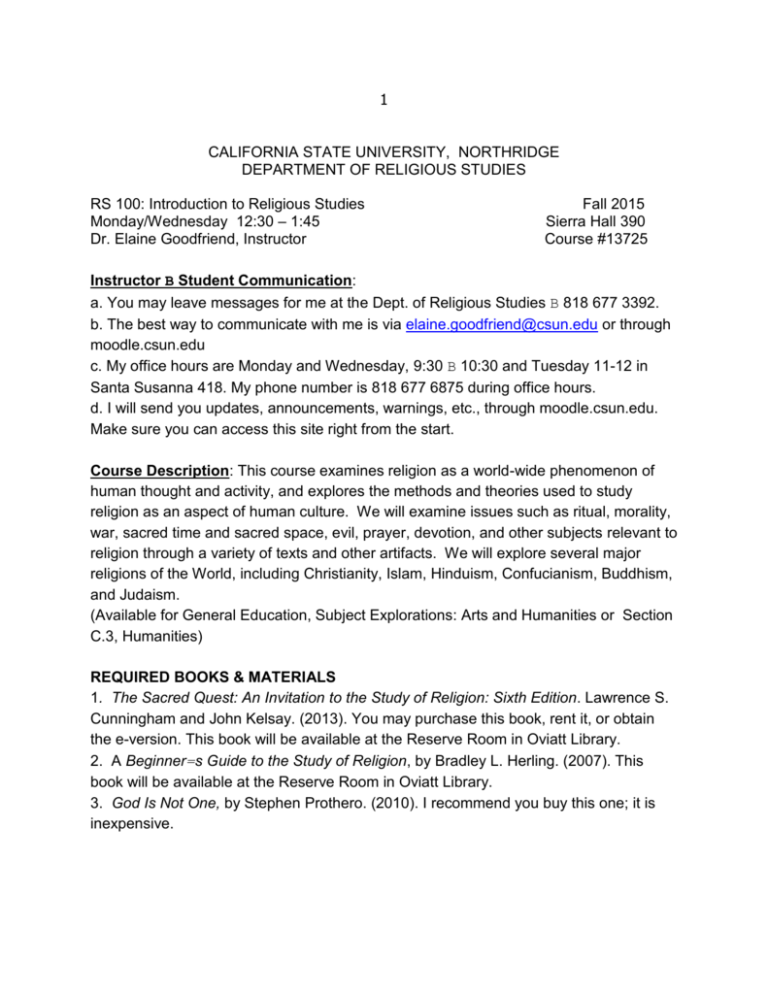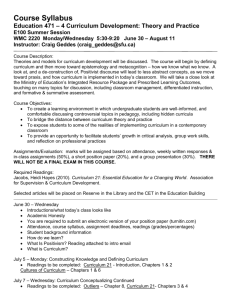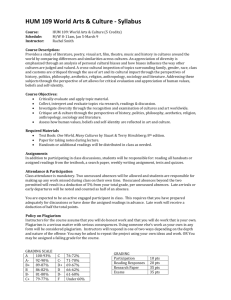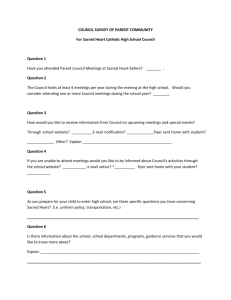CALIFORNIA STATE UNIVERSITY, NORTHRIDGE DEPARTMENT
advertisement

1 CALIFORNIA STATE UNIVERSITY, NORTHRIDGE DEPARTMENT OF RELIGIOUS STUDIES RS 100: Introduction to Religious Studies Monday/Wednesday 12:30 – 1:45 Dr. Elaine Goodfriend, Instructor Fall 2015 Sierra Hall 390 Course #13725 Instructor B Student Communication: a. You may leave messages for me at the Dept. of Religious Studies B 818 677 3392. b. The best way to communicate with me is via elaine.goodfriend@csun.edu or through moodle.csun.edu c. My office hours are Monday and Wednesday, 9:30 B 10:30 and Tuesday 11-12 in Santa Susanna 418. My phone number is 818 677 6875 during office hours. d. I will send you updates, announcements, warnings, etc., through moodle.csun.edu. Make sure you can access this site right from the start. Course Description: This course examines religion as a world-wide phenomenon of human thought and activity, and explores the methods and theories used to study religion as an aspect of human culture. We will examine issues such as ritual, morality, war, sacred time and sacred space, evil, prayer, devotion, and other subjects relevant to religion through a variety of texts and other artifacts. We will explore several major religions of the World, including Christianity, Islam, Hinduism, Confucianism, Buddhism, and Judaism. (Available for General Education, Subject Explorations: Arts and Humanities or Section C.3, Humanities) REQUIRED BOOKS & MATERIALS 1. The Sacred Quest: An Invitation to the Study of Religion: Sixth Edition. Lawrence S. Cunningham and John Kelsay. (2013). You may purchase this book, rent it, or obtain the e-version. This book will be available at the Reserve Room in Oviatt Library. 2. A Beginner=s Guide to the Study of Religion, by Bradley L. Herling. (2007). This book will be available at the Reserve Room in Oviatt Library. 3. God Is Not One, by Stephen Prothero. (2010). I recommend you buy this one; it is inexpensive. 2 4. RS 100 Reader. If you look on moodle you will find an folder with files that you should print out for your Reader. By the 3rd week of the semester, have all of these printed and bound together in a folder (3 ring binder?) and bring the folder to every class. It’s that easy! REQUIREMENTS: 1. Exams: There will be one exam, a final, worth 20% of your grade. You will receive an extensive and detailed study guide at least one week before the exam. You will not be admitted to the final exam if you are more than 15 minutes late. 2. Quizzes: You will have 8 quizzes over the course of the semester. (Several have part A and part B). The dates are indicated below. These quizzes will be both online at moodle or in class. For a quiz that is taken in class, you may bring 1 index card (3 x 5) of hand-written notes for each quiz and the questions will generally be posted online a week before. Your answers must be in your own words. If you write exactly what the book says, you will lose points. The first quiz is based on the syllabus and is found at moodle. Do it before 8/31. The online quizzes are “open book” with unlimited time. (8 quizzes = 70% of your grade) 3. Assignments: Written and Oral Experience the Sacred: this category necessitates an Aout-of-class@ activity and a written response. You must also offer a short oral report on your visit. (10%) 4. Extra Credit: a. Choose a subject from the list provided on moodle and do a short (5-10 minute) presentation, perhaps with power-point illustrations or a handout for the class. To do this you must meet with me beforehand to discuss it. You can get 2-4 extra points depending on the effort you invest. b. There might be a lecture or movie sponsored by CSUN which is in some way relevant to your understanding of Religion. Get my approval, attend it, and write up a one or two page summary and response and receive 1-2 points extra credit, depending on the effort you put into it. (Maximum 5 points extra credit). 5. Attendance and Tardies: Attendance will be taken at the beginning of class. Missing four or more classes will result in a lowered grade (1 point per absence will be deducted from your final average). Every two times you arrive late will count as an absence. If you have three or less absences and no tardies, I will add 2 points to your final grade. If you must leave early, 3 notify me in advance or I will mark you absent. If you are late for class, confirm with me right after class that you were present. Claims to have been present will not be accepted at a later date. 6. WARNINGS: a. Plagiarizing will be penalized with a grade of F. This means that you cannot copy the work of your fellow student or look up answers from the internet without citing the source. Taking information from the internet without offering the source will result in a grade of zero (0) on the assignment and a disciplinary report sent to the Office of Student Affairs. Including footnotes doesn=t cost you a penny, but not including them could be very costly. b. Behavior that is in any disruptive will not be tolerated in class. If you talk to your friend while I or another student is addressing the class, that counts as disruptive. If your behavior is repeatedly disruptive, your misconduct will be reported to Office of Student Affairs. c. Before class begins, take care of all your bodily needs. Put your cell phone away during class or I will ask you to leave. If I see you texting during class I will ask you to put it away immediately and mark you absent. Don=t put your head on your desk. d. You may NOT use a laptop in class unless you sit in the first row and sign a contract that you won’t use your laptop for issues unrelated to class, and you won’t access the internet unless I ask you to. This rule is intended to enhance your learning as well as the focus of the students sitting in back of you. e. The Instructor reserves the right to modify/supplement readings and assignments in order to facilitate learning. Course Schedule and Plan Monday, 8/24: Introduction to RS 100 and Religion. Wednesday, 8/26: Introduction to the Academic Study of Religion: Method. Readings: Herling, 1 B 20. Monday, 8/31: Introduction to the Academic Study of Religion: Theory. Readings: Herling, 23 B 45. Wednesday, 9/2: Classic Theories in the Study of Religion. Readings: Herling, 47 B72. 4 Monday, 9/7: Labor Day. Wednesday, 9/9: Classic Theories in the Study of Religion, continued. Readings: Herling, 73 B 81. Quiz #1. Monday, 9/14: Class is cancelled. There will be an online quiz on “Classic Theories in the Study of Religion,” continued. Readings: Herling, 82 B 102. Quiz #2. Wednesday, 9/16: Religion from Other Angles. Readings: Herling, 105 B 121; print material posted on moodle for class. Monday, 9/21: Toward a Definition of the Sacred. Readings: The Sacred Quest, 11 B 23. Wednesday, 9/23: Class is cancelled. There will be an online quiz on “The Nature of the Sacred.” Readings: The Sacred Quest, 25-35. Quiz #3 Monday, 9/28: Class is cancelled. There will be an online quiz on “The Appearance of the Sacred.” Readings: The Sacred Quest, 37 B 53; Bible - Exodus 1-3. Quiz #4 Wednesday, 9/30: The Language/s of the Sacred. Readings: The Sacred Quest, 55 B 69. Monday, 10/5: Class is cancelled. There will be an online quiz on God Is Not One: Introduction and Islam, part 1. Readings: Prothero, 1 B 40. Quiz #5 Wednesday, 10/7: Islam, part 2. Readings: Prothero, 40- 63. 5 Monday, 10/12: Ritual. Readings: The Sacred Quest, 71 B 83. Wednesday, 10/14: Sacred Communities. Readings: The Sacred Quest, 85 B 99. Monday, 10/19: Judaism, part 1. Readings: Prothero, 243-278. Wednesday, 10/21: Judaism, part 2. Readings: Prothero, 243-278. Quiz #6 Monday, 10/26: Assignment on Ritual due; Discussion of Ritual Report. Wednesday, 10/28: The Problem of Evil. Readings: The Sacred Quest, 101-114. Monday, 11/2: Christianity, part 1. Readings: Prothero, 65-99. Wednesday, 11/04: Christianity, part 2. Readings: Prothero, 65-99. Monday, 11/9: Religion and Morality. Readings: The Sacred Quest, 117 B 130. Quiz #7 Wednesday, 11/11: Veterans’ Day: No class. Monday, 11/16: Hinduism. Readings: Prothero, 131-168. Wednesday, 11/18: Buddhism, part 1. Readings: Prothero, 169-201. 6 Monday, 11/23: No class. Wednesday, 11/25: Buddhism, part 2. Readings: Prothero, 169-201. Monday, 11/30: Daoism. Readings: Prothero, 279-315. Quiz #8 Wednesday, 12/1: The Quest for Salvation. Readings: The Sacred Quest, 133-145 Monday, 12/6: Confucianism & Conclusion. Readings: Prothero, 101-124, 317-340. Final Exam: Religious Studies Student Learning Objectives: 1. Students will be able to recognize and to articulate (orally and in writing) the difference between an academic approach to religion and a personal, devotional approach. 2. Students will be able to demonstrate a basic level of proficiency in recognizing the major contributors to the modern study of religion and their models/theories from philosophy, theology, the history of religions, and the social sciences. 3. Students will be able to understand the following terms in their conventional, popular usage, and then discuss the variety of ways that religious studies scholars have critiqued, expanded, or problematized these: religion, religious, myth, ritual, symbol, philosophy, subjectivity, objectivity, secular/secularization, cult, sect, mysticism, theism, atheism, polytheism, monotheism, spirituality, magic, paganism, animism, canon, religious violence, post-colonialism, individualistic compared to community-based religions. 4. Students will be able to explain and give basic examples of the social function of religion with regard to gender, ethnicity, and nationality. 5. Students will be able to recognize religiosity in an aspect of modern culture such as different forms of media, art, music, films, politics, sports, and the public discourse on science. 7 6. Students will be able to demonstrate a basic level of proficiency in describing two specific religious traditions, including their historical development, major beliefs and practices, and demonstrate a basic level of proficiency in interpreting religious texts and rituals from each religious tradition. General Education Goal: Students will understand the rich history and diversity of human knowledge, discourse and achievements of their own and other cultures as they are expressed in the arts, literatures, religions, and philosophy. General Education Student Learning Objectives, Arts and Humanities: 1. Students will explain and reflect critically upon the human search for meaning, values, discourse and expression in one or more eras/stylistic periods or cultures. 2. Students will analyze, interpret, and reflect critically upon ideas of value, meaning, discourse and expression from a variety of perspectives from the arts and/or humanities; 3. Produce work/works of art that communicate to a diverse audience through a demonstrated understanding and fluency of expressive forms; 4. Students will demonstrate ability to engage and reflect upon their intellectual and creative development within the arts and humanities; 5. Students will be able to use appropriate critical vocabulary to describe and analyze works of artistic expression, literature, philosophy, or religion and a comprehension of the historical context within which a body of work was created or a tradition emerged; 6. Students will learn to describe and explain the historical and/or cultural context within which a body of work was created or a tradition emerged.







